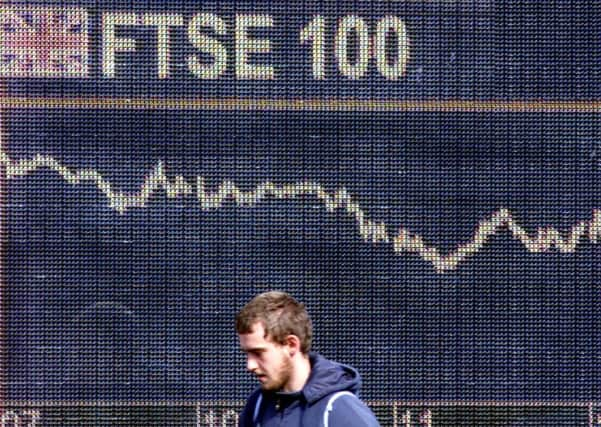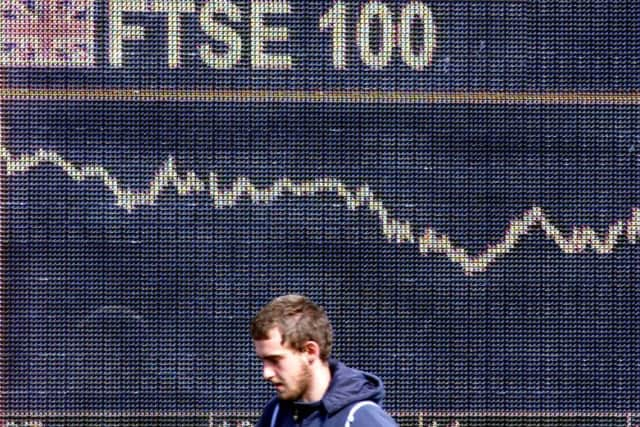Bill Jamieson: Home not always best for UK investors
This article contains affiliate links. We may earn a small commission on items purchased through this article, but that does not affect our editorial judgement.


Many top FTSE 100 companies have until now been solid dividend performers. Why look further afield? Investing overseas often involved an income sacrifice. And UK-generated profits were less vulnerable to political setback and currency worries.
• READ MORE: Markets and economy news
But as fund managers returned from their summer holidays, a notable shift gathered pace. Equity portfolios are shifting towards overseas markets and away from dependency on the traditional safe havens of the FTSE 100.
Advertisement
Hide AdAdvertisement
Hide Ad

Last week I highlighted the FTSE “index agnostic” approach of Standard Life’s well-regarded UK Equity Income Trust and its greater reliance on mid-cap and smaller companies. Now other trusts are moving to downscale their weighting in the FTSE behemoths and build larger holdings in overseas markets.
Mark Whitehead, portfolio manager of Securities Trust of Scotland, issued a warning to investors at the end of last week that too great a reliance on UK-based companies has come to carry a heavy cost in terms of lost profits.
He says that investors who had committed the current ISA limit of £20,000 five years ago would have been £8,300 better off had they invested in global equities rather than just UK equities. Now, we know past performance is not a reliable guide to the future. But there is an evident risk for investors staying highly committed to the big UK income stocks.


Despite the fact that it has never been easier to invest in overseas funds available through a multiple of fund platforms, “a home bias”, he writes, “is perfectly understandable, due to the familiarity people may have with home grown firms.”
But, “this adds significant level of risk. Even the largest single nation economy can lack diversification, and the UK market suffers from a relatively extreme level of concentration.”
He points out that more than half of the FTSE 100 is in financials, consumer goods, and oil and gas. Given the pressure on commodity prices and the volatility of the oil sector particularly, over-exposure to the UK could result in wide value swings.
Advertisement
Hide AdAdvertisement
Hide AdA global view, he says, is particularly important for those investing for income. “The UK market is dependent on a tiny number of companies to maintain and grow their dividends. The top 20 dividend paying stocks in the UK account for 64 per cent of the total dividends paid by all companies in the FTSE All Share. This compares to just 18 per cent in the MSCI All Country World Index.”
The result is that, if something goes wrong with one of those UK giants, “it could have an extremely adverse effect on an investor’s income stream.
This is the predicament currently facing BP and Royal Dutch Shell, two of the UK’s giants. Both pay an attractive dividend, but the current level is not covered by free cash flow. This means that they face the real prospect of cutting the dividend.”
He adds that, by investing globally, investors can avoid the risks inherent in single country exposure. But there is another advantage. “It also opens up the investible universe and allows us to access some of the best companies in the world, regardless of sector or location.
“Look at the giants of the technology sector and some of the biggest growth stories in recent times: Apple, Facebook, Tencent, Samsung and Alibaba to name a few. None are UK companies.”
Whereas in the past, UK investors had concerns about political risks in overseas markets, the UK market now has to contend with political risk itself over the outcome of Brexit negotiations – “We still have little idea of what a post-Brexit UK will look like, and this uncertainty has very real consequences for businesses and the economy.”
His conclusion? Even if you pick the best fund manager to supervise a UK-only portfolio, these risks, constraints and flaws will be present. Risks, he concludes, can be mitigated “by widening the investment remit and a global portfolio is the widest of all”.
Elsewhere, veteran fund manager Harry Nimmo has also tilted the Standard Life UK Smaller Companies Trust portfolio in favour of companies with international earnings – a decision made in the wake of the Brexit vote. The investment team’s screening tool highlights more internationally-focused businesses as looking more attractive across a number of criteria.
Advertisement
Hide AdAdvertisement
Hide AdIndeed, says Nimmo, more than half of the profits from the company’s portfolio are derived from outside the UK. East, west, home, it seems, is not always best.